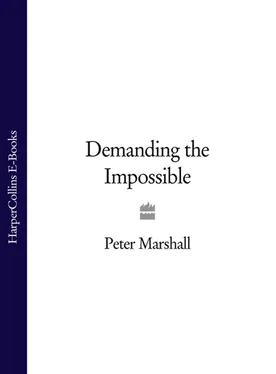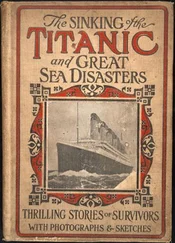Swift of course satirizes the depraved and bestial nature of some human beings in his portrayal of the Yahoos. These hairy creatures in human form are avaricious, perverse, restive, cunning, and passionate. They fight over food and shining stones and move around in packs waging war on each other. They live in a state of ‘anarchy’ in the negative sense of violent disorder and mayhem. They would be more at home in Hobbes’ ‘state of nature’ than Locke’s.
By contrast Swift presents the Houyhnhnms as dignified horses who believe that reason is enough to govern rational creatures: ‘Nature and Reason were sufficient Guides for a reasonable Animal, as we pretended to be, in shewing us what we ought to do, and what to avoid.’ 7 Their reason however is not so much a tool of analysis, or a power of drawing logical inferences from observed facts, but more like an organ of cool common sense. They live in a society practising universal benevolence and perfect sincerity. They also live in a golden age of primitive communism: they have no metal or clothes and few wants. Their fundamental maxim is that nature is very easily satisfied. Population is controlled by moral restraint and abstinence. Males and females receive the same education which encourages temperance, industry, exercise and cleanliness.
Since the Houyhnhnms can govern themselves they have no need for political authority, law and coercion. Government is reduced to a periodic representative council of the whole nation which meets for five or six days every fourth year to co-ordinate distribution and regulate the population growth. They try to reach unanimity in all decisions. The council does not make laws but only issues exhortations, for they have ‘no Conception how a rational Creature can be compelled , but only advised, or exhorted ; because no Person can disobey Reason, without giving up his Claim to be a rational Creature’. 8 The society is therefore not governed by law but by the dictates of ‘reason’ which everyone voluntarily accepts. In this anarchist society, Gulliver exalts in the fact that
I had no Occasion of bribing, flattering or pimping, to procure the Favour of any great Man, or his Minion. I wanted no Fence against Fraud or Oppression: Here was neither Physician to destroy my Body, nor Lawyer to ruin my Fortune: No Informer to watch my Words and Actions, or forge Accusations against me for Hire: Here were no Gibers, Censurers, Backbiters, Pickpockets, Highwaymen, Housebreakers, Attorneys, Bawds, Buffoons, Gamesters, Politicians, Wits, Spleneticks, tedious Talkers, Controvertists, Ravishers, Murderers, Robbers, Virtuoso’s; no Leaders or Followers of Party and Faction; no Encouragers to Vice, by Seducement or Examples: No Dungeon, Axes, Gibbets, Whipping-posts, or Pillories. 9
At the same time, there are some strongly negative aspects to this anarchist utopia. The unit of society is a strongly patriarchal family and the economy is based on the labour of the Yahoos. The rational Houyhnhnms have no human warmth or passion and are strongly ascetic. They have no love in the sexual sense, or partiality for their own children. The economy is that of the stone age. No apparent interest exists in science and technology: there are no wheels or metals in the land. It would even seem that yet again Swift was being slyly ironic in presenting the Houyhnhnms as supposedly ideal beings. But it remains the case that when Gulliver returns home to England he comes to prefer the smell and company of his horse to his family, and tries to apply the ‘excellent lessons of virtue’ he had learnt among the Houyhnhnms.
George Orwell claims that Swift was intermittently ‘a kind of anarchist’ and that Book IV of Gulliver’s Travels is a picture of an anarchistic society. But for him it also illustrates the totalitarian tendency which he claims is explicit in the anarchist or pacifist vision of society. The only arbiter of behaviour is public opinion which can be less tolerant than any system of law: ‘When human beings are governed by “thou shalt not”, the individual can practise a certain amount of eccentricity: when they are supposedly governed by “love” or “reason”, he is under continuous pressure to make himself behave and think in exactly the same way as everyone else.’
It certainly is the case that the Houyhnhnms are unanimous on almost all subjects, have no word for ‘opinion’ in their language, and express no difference of sentiments in their conversations. But Orwell goes too far in suggesting that this is ‘the highest stage of totalitarian organization’. 10 He uses the example of the Houyhnhnm society to attack anarchism and pacifism in general. Yet the Houyhnhnms do not persecute dissidents or force people to conform in thought or action.
Orwell’s point about the potential tyranny of reason is more telling. In the rational society of the Houyhnhnms there would be no room for personal idiosyncrasies or bizarre tastes; no one would be able to stick out their tongue or tell their neighbours to go to hell. But Orwell overlooks the point that unlike Yahoo humanity, the Houyhnhnms are genuinely governed by reason. For them, there is no conflict between reason and passion, conscience and desire. Since truth for them is universal and self-evident it inevitably happens that as purely rational beings they recognize it and act accordingly. Godwin was to make a similar point at the end of the century.
Swift’s position is undoubtedly ambivalent and paradoxical. He is a Tory Dean who appears at times as a rational anarchist. The son of English settlers in Ireland, he called for Irish economic independence. He despised the human race and yet was at great pains to improve it. Orwell catches the ambivalence of his position when he calls him ‘a Tory anarchist, despising authority while disbelieving in liberty, and preserving the aristocratic outlook while seeing clearly that the aristocracy is degenerate and contemptible’. 11 Nevertheless, Swift’s picture of the country of the Houyhnhnms is genuinely libertarian, however flawed. Its view of the ‘state of nature’ in which spontaneous order prevails without government may well be more accurate than Hoboes’ romantic myth of universal war. It is for this reason that the first great anarchist thinker William Godwin described the Voyage to the Houyhnhnms as ‘one of the most virtuous, liberal and enlightened examples of human genius’. 12
Since most literary historians cannot understand the feasibility of anarchism, they invariably suggest that works by great authors advocating a free society must be ironic. This is the case with Swift, and Edmund Burke. Burke has been best remembered for his attack on all innovation in his Reflections on the Revolution in France (1790), but it is often forgotten that as a young man he was a liberal Whig who supported American Independence and advocated economic reform. In addition, he wrote A Vindication of Natural Society (1756) which offers one of the most powerful arguments for anarchist society made in the eighteenth century. His starting-point, which he shares with the Taoists and the French philosophes , is a confidence in nature which ‘if left to itself were the best and surest Guide’. 13
Human beings in a state of nature originally lived ‘with their Brethren of the other Kinds in much equality’ and were wholly vegetarian. In the ‘natural’ society in which they lived, they followed their ‘natural Appetities and Instincts, and not in any positive institution’. Governed by reason, they had no need for external government: ‘We begin to think and to act from Reason and Nature alone.’ 14 Unfortunately, human beings invented artificial rules to guide nature. They created a political society held together by laws which became a violation of nature and a constraint on the mind. Since religion and government are closely connected, once government is considered to be necessary, it draws in an artificial religion and ‘Ecclesiastical Tyranny under the Name of Church Government’. 15
Читать дальше












